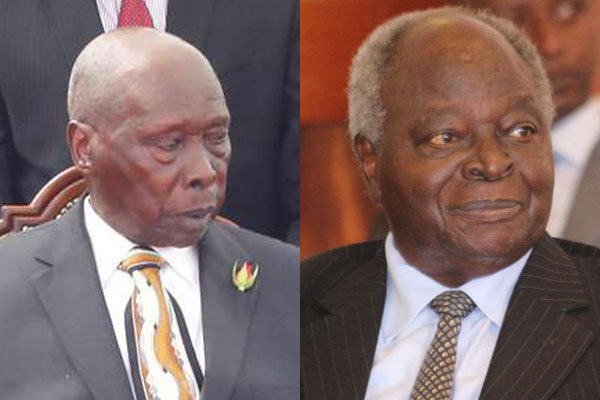Of officials, by officials, for officials: Must we pay millions to rich men like Moi, Kibaki?
OTHER VIEW POINTS
In his legendary Gettysburg address, US president Abraham Lincoln referred to the American government as being “of the people, by the people, for the people.” In other words, ordinary people were the raison d’être for governance and government.
Over the years, of course, that conception of governance and government has become corrupted by big business and special interest groups. Today, the US government is a mammoth bureaucracy that is incapable of solving even life-and-death issues of citizens.
For instance, US government officials have been reduced to eulogising victims of mass murder year in, year out. It is almost as if condoling families of mass-shooting victims are events in the national calendar. By contrast, New Zealand, after the massacre of Muslim worshippers, was able to enact gun control measures that will greatly reduce, if not eliminate, similar incidents in the future.
RETIREMENT BENEFITS
But I digress. Abraham Lincoln’s concept of government came to mind when I saw the figures budgeted for the retirement benefits of former presidents Daniel arap Moi and Mwai Kibaki in the 2019-2020 budget.
The former presidents will each get Ksh3 million ($30,000) every month starting July, an increase from previous years. They are entitled to two personal assistants, four drivers, six bodyguards, four messengers, and, get this, four secretaries.
Maintenance of this cast of support staff to the two retired presidents will cost the taxpayer over Ksh100 million ($1 million) a year. In addition, the state has allocated millions of shillings for the purchase of new vehicles for the two men. Also, Mwai Kibaki has an office building purchased by government at a cost of Ksh250 million ($2.5 million)!
No matter what one feels about the two gentlemen and their corrupt governments, one would not begrudge them a personal assistant, bodyguards and a modest monthly payment. Anything beyond that is irresponsible and extortionist, and points to a government that exists for the purpose of its officials, active or retired.
This point is further underlined when you consider that Moi and Kibaki are among the richest people in Africa and the world, with vast land holdings and interests in myriads of businesses. We do not know how people who worked in government all their lives were able to amass such wealth. Why don’t they pamper themselves using their own money?
And for what purpose the lavish offices, and the multiple secretaries and messengers? The two hardly travel or transact business on behalf of the government. They do not lead peace missions to conflict zones. They do not act as election observers. They do not lead goodwill missions abroad to lobby on behalf of the country or a cause. They spend their time overseeing their vast business interests. So in a real and painful sense, the government is facilitating these individuals to expand their business empires.
THIS IS KENYA
We can understand the government facilitating former presidents who are still active on behalf of the country, the region, the UN, or in furtherance of a humanitarian cause. For instance, former presidents like Jimmy Carter, Kenneth Kaunda, Nelson Mandela, Thabo Mbeki, Benjamin Mkapa et al, continued to work for worthwhile causes way after they retired from office.
But, pray, why would Moi and Kibaki need offices they hardly visit, if at all? And four secretaries! To do what? But hey, this is Kenya, where a significant amount of the public’s hard-earned money goes to paying for the ostentatious lifestyles of its officials, both active and retired.
In some Nordic countries, heads of government use public transport to go to work. Nelson Mandela used a modest motorcade, and after 27 years in prison earning nothing, he donated a part of his salary to worthy causes. These people understand that public money can be put to better use. Their sense of personal worth or success is not pegged to shillings and cents. What gives them a sense of accomplishment is fulfilling their mandate while holding state office.
In Kenya, active and retired officials will squeeze the last penny from the poor for zero work done. Their sense of achievement is measured in gold and silver. The ambition of every politician is to be able to travel around the country, dishing out handouts, playing saviour to the poor who are that way because they do not pray hard enough. God has blessed me; they remind the poor.
The moral thing for Moi and Kibaki is to donate their pensions back to government, and give up the offices and perks. But even then, would our concept of government “of state officials, by state officials, for state officials” change?
Tee Ngugi is a Nairobi-based political commentator
The East African

